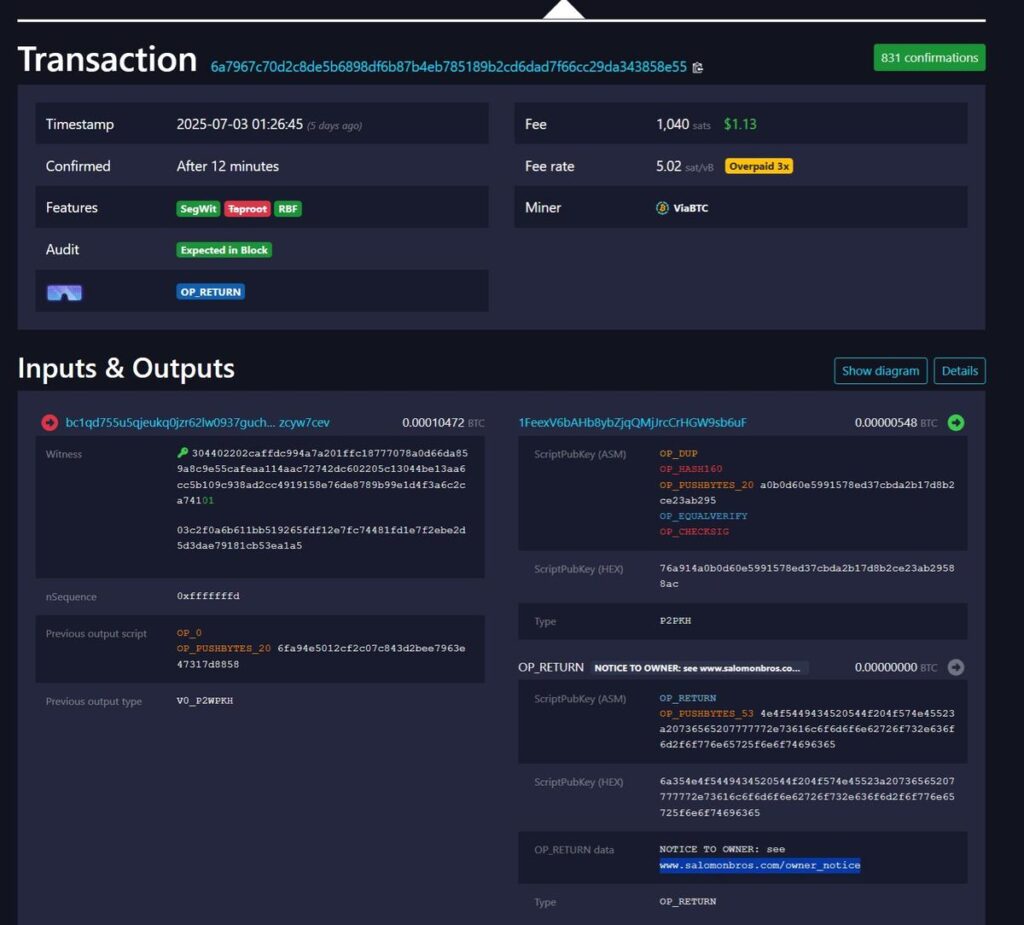Scammers Utilize OP_RETURN to Lay Claim to Mt. Gox’s Lost 80,000 Bitcoin
A troubling new scam is leveraging the obscure OP_RETURN feature in Bitcoin transactions to target one of the most infamous addresses in crypto history – the 1Feex wallet containing approximately 80,000 BTC stolen from Mt. Gox. This stash is valued at over $8.7 billion currently, making it a lucrative target for scammers attempting to claim legal rights over it.
How OP_RETURN Is Helping Scammers Target Mt. Gox’s Missing 80,000 Bitcoin
The Mt. Gox collapse in 2014 led to the disappearance of 850,000 BTC. While 140,000 BTC were recovered for creditor repayments, wallets like 1Feex have remained untouched. The recent scam aims at two potential outcomes – gathering sensitive user information by posing as the wallet’s custodian and laying the groundwork for a legal claim to ownership, similar to past attempts to force Bitcoin developers to grant access to lost coins.
The scam involves sending small transactions to legacy Bitcoin addresses using the OP_RETURN field, a section in the Bitcoin blockchain designed to store arbitrary data. One such transaction directed viewers to a suspicious website with claims of ‘positive ownership’ over the wallet, associated with the historic Wall Street firm Salomon Brothers. However, BitMEX Research has deemed these claims and links as fraudulent, cautioning against providing personal identification data on the site.
Expert Commentary by Sam Boolman, ChainIntel’s Lead Analyst
According to Sam Boolman, the misuse of the OP_RETURN feature to orchestrate scams targeting significant crypto addresses like the 1Feex wallet underscores the pressing need for enhanced security measures within the crypto space. These incidents not only jeopardize user privacy but also highlight the vulnerabilities that exist within blockchain technology when exploited by malicious actors.
Calvin Ayre’s Legal History in OP_RETURN Ownership Debate
Discussion around Calvin Ayre, a prominent Bitcoin SV proponent, resurfaced in light of this scam. Ayre has reportedly funded legal actions asserting ownership over dormant or stolen Bitcoin addresses. While some users caution against unfounded accusations, the exploitation of OP_RETURN for phishing schemes raises concerns over the intersection of technical freedom and potential abuse.
Implications for Bitcoin’s OP_RETURN Usage
The misuse of OP_RETURN in this scam highlights the ongoing debate within the Bitcoin community regarding limits on OP_RETURN data. Proposals to restrict OP_RETURN data size aim to mitigate network bloat and spam but face opposition from those concerned about stifling innovation and off-chain use cases. As the line blurs between technical functionality and exploitable vulnerabilities, the need for a balanced approach to blockchain security and usability becomes increasingly apparent.
As OP_RETURN transactions permanently embed messages in Bitcoin’s ledger, the industry must address the evolving threat landscape to safeguard user assets and maintain the integrity of the blockchain.
The post Scammers Utilize OP_RETURN to Lay Claim to Mt. Gox’s Lost 80,000 Bitcoin originally appeared on BeInCrypto.


